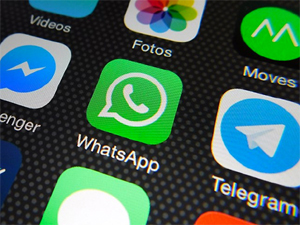



Date:31/03/17
 Almost all of popular instant messengers for smartphones contain a vulnerability in the code that can be used by criminals, reports “Kommersant” with reference to the study of Solar Security. While in mobile chat for iOS experts found more errors than in their versions for Android.
Almost all of popular instant messengers for smartphones contain a vulnerability in the code that can be used by criminals, reports “Kommersant” with reference to the study of Solar Security. While in mobile chat for iOS experts found more errors than in their versions for Android.
With the help of technology auto binary analysis of Solar Security code checked out nine of the most popular instant messengers: Telegram, WhatsApp, Viber, Facebook Messenger, Signal, Slack, Skype, WeChat and QQ International. As a result of check it was found that critical vulnerabilities not only contains the Signal messenger for Android. However, its code still contains the six errors of the average level and seven low. In the code of Facebook Messenger and Slack there are four critical errors, while others have more.
The most common critical vulnerabilities of instant messaging apps on Android include weak algorithms for encryption and hashing, insecure implementation of SSL, use of blank passwords. These errors increase the risk of interception of usernames and passwords stored on the device.
the iOS version of the messengers are more vulnerable than clients for Android. So, in Facebook Messenger for iOS the company’s specialists Solar Security found 12 critical vulnerability in Viber 15, Skype 17. Most errors were discovered in the Chinese instant messenger QQ International and WeChat.
According to experts Solar Security, the fact that iOS versions of applications contains more errors, most likely due to the fact that Android developers “more attentive to the level of protection” as “itself is less safe.”
Viber announced that the company is never found in its messenger critical vulnerabilities. The company argued that application quality experts check Viber and third-party experts, in addition, using the “automation tools and Analytics to detect errors and prompt correction of failures in the application.” In Facebook also noted that new products are tested for safety by a “special teams”
Study: WhatsApp and Viber are more vulnerable on iOS than on Android
 Almost all of popular instant messengers for smartphones contain a vulnerability in the code that can be used by criminals, reports “Kommersant” with reference to the study of Solar Security. While in mobile chat for iOS experts found more errors than in their versions for Android.
Almost all of popular instant messengers for smartphones contain a vulnerability in the code that can be used by criminals, reports “Kommersant” with reference to the study of Solar Security. While in mobile chat for iOS experts found more errors than in their versions for Android.With the help of technology auto binary analysis of Solar Security code checked out nine of the most popular instant messengers: Telegram, WhatsApp, Viber, Facebook Messenger, Signal, Slack, Skype, WeChat and QQ International. As a result of check it was found that critical vulnerabilities not only contains the Signal messenger for Android. However, its code still contains the six errors of the average level and seven low. In the code of Facebook Messenger and Slack there are four critical errors, while others have more.
The most common critical vulnerabilities of instant messaging apps on Android include weak algorithms for encryption and hashing, insecure implementation of SSL, use of blank passwords. These errors increase the risk of interception of usernames and passwords stored on the device.
the iOS version of the messengers are more vulnerable than clients for Android. So, in Facebook Messenger for iOS the company’s specialists Solar Security found 12 critical vulnerability in Viber 15, Skype 17. Most errors were discovered in the Chinese instant messenger QQ International and WeChat.
According to experts Solar Security, the fact that iOS versions of applications contains more errors, most likely due to the fact that Android developers “more attentive to the level of protection” as “itself is less safe.”
Viber announced that the company is never found in its messenger critical vulnerabilities. The company argued that application quality experts check Viber and third-party experts, in addition, using the “automation tools and Analytics to detect errors and prompt correction of failures in the application.” In Facebook also noted that new products are tested for safety by a “special teams”
Views: 317
©ictnews.az. All rights reserved.Similar news
- The World in 2011: ICT Facts and Figures
- Analysis: BlackBerry licensing seen RIM's likeliest scenario
- Sergey Brin, Google Co-Founder, Says Internet Freedom Facing Greatest Threat Ever
- Drones are about to fill the skies within the next 5 years
- Will robots replace bank employees?
- Gartner predicts 7 percent growth of smartphone market in 2016
- By 2020, the app market with be worth $102 billion
- Cisco Visual Networking Index predicts 10 billion new connected devices by 2020
- IoT devices will overtake mobile phones by 2018
- Consulting firm predicts that half the world will be using mobile internet by 2020
- The top ten features coming to smartphones by 2017: Gartner
- Gartner’s top 10 security predictions
- 12 wild predictions about the world in 2036, according to Americans
- Cloud computing slows energy demand
- Bendable, curved, foldable: New report looks at the future of wearable and mobile displays





















